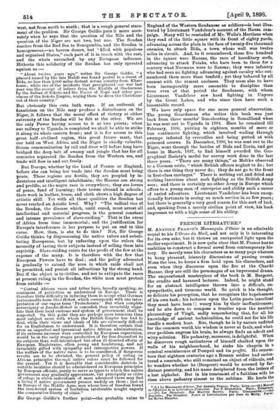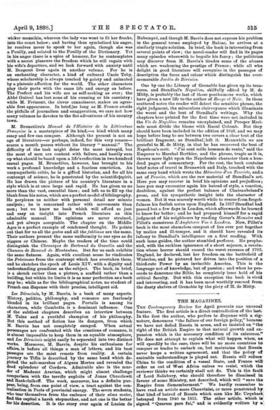FRENCH LITERATURE.' 1 M. ANATOLE FRANCE'S Mannequin d'Osier is an admirable
sequel to his L'Orme du Mail, and not only is it interesting for its own sake, but it throws an unexpected light upon the earlier experiment. It is now quite clear that M. France has no ambition to construct a formal novel from contemporary his- tory. He merely uses his characters as so many pegs whereon to hang pleasant, leisurely discussions of passing events. None the lees, he keeps a firm hold upon his characters, and even when they discourse upon the fire at the Charite Bazaar, they are still the personages of an impersonal drama. The unquestioned masterpiece of the book is M. Bergeret, the erudite and harassed lecturer. Indeed, he might stand for an abstract intelligence thrown into a difficult, un- sympathetic, and tiresome world. So quick is his thought, so delicate his perception, that he recognises the hopelessness of his own task ; his lectures upon the Latin poets (excellent they must have been !) weary him by their ineffectiveness; and he sits down to compose a treatise upon the nautical phraseology of Virgil, sadly remembering that, for all his knowledge of ancient technicalities, he could not for his life handle a modern boat. But, though he is by nature unfitted for the common world, his wisdom is never at fault, and what- ever problem engross his brain, he always finds an adroit and witty solution. His pedantry, moreover, is delightful. When he discovers rough caricatures of himself chalked upon the walls of his neighbourhood, he sinks his chagrin in a comical reminiscence of Pompeii and its graffiti. He remem- bers that eighteen centuries ago a Roman soldier had carica- tured a comrade, who still remained an object of ridicule, and he wonders whether he (Bergeret) would be scorned by far- distant posterity, and his name deciphered from the letters of a lost alphabet. But in his treatment of a faithless wife he rises above pedantry almost to the sublime. He hurls the • (1.) Le Mannequin d'Osier. Par Anatole France. Paris: Levy.---(24 Mous{ de FIlistoire de la Latirature Francais.. Par F. Briinetiiire. Delagrs••• —(3 ) Les Dieracines. Par Maurice Barres. Paris: Obarpentier.--- Napoleon. Par Stendhal. Notes et Introduction par Jean de way. Pa": La Berne Blanche.
wicker mannikin, whereon the lady was wont to fit her frocks, into the court below ; and having thus symbolised his anger, he resolves never to speak to her again, though she was a Pouilly, and related to the Pouilly of the Dictionary. Yet in his anger there is a spice of humour, for he contemplates with a secret pleasure the freedom which he will regain with his wife's departure, and we look forward with anxiety until M. Bergeret lives again in another volume. For he is an enchanting character, a kind of cultured Uncle Toby, whose scholarship is always touched by gaiety and animated by a platonic affection for the world. The other characters play their parts with the same life and energy as before. The Prefect and his wife are as self-seeking as ever ; the Abbe Guitrel has lost none of his cunning or his casuistry ; while M. Fremont, the clever connoisseur, makes an agree- able first appearance. In brieMso long as M. France avoids the pitfalls of journalism and exaggeration, we care not how many volumes he devotes to the flat adventures of his country town.
M. Brunetiere's Manuel de l'Histoire de la Litterature Francaise is a masterpiece of its kind,—a kind which many essay and few can conquer. Although the present is not an age of literature—or perhaps, indeed, for this very reason— scarce a month passes without its literary "manual." The difficulty of the task might deter the most intrepid, but the most of men are content with failure, and hastily sum up what should be based upon a life's reflection in two hundred casual pages. M. Brunetiere, however, has brought to his work a profound knowledge and a fearless conviction. An unsympathetic critic, he is a gifted historian, and for all his contempt of science, he is penetrated by the scientificispirit. He has drawn the picture of his country's literature in a style which is at once large and rapid. He has given us no more than the vast, essential lines ; and left us to fill up the blsnk from his notes, which are aperfect model of bibliography. He perplexes us neither with personal detail nor minute analysis ; he is concerned rather with movements than men; but we know no book which will afford so just and easy an insight into French literature as this admirable manual. His opinions are never strained, and yet always acceptable. The chapter on the Middle Ages is a perfect example of condensed thought. He points out that for us all the gestes and all the fabliaux are the same. Their authors present the same uniformity to our eyes as do niggers or Chinese. Maybe the readers of the time could distinguish the Chronigue de Bertrand du Guesdin and the Chanson de Renaud de Montauban. But for us each exhibits the same flatness. Again, with excellent sense he vindicates the Precieuses from the contempt which has overtaken them, and he sketches the epoch of Louis XIV. with a dignity and understanding grandiose as the subject. The book, in brief, is a sketch rather than a picture, a scaffold rather than a building, but within its limits it is as near perfection as a book may be; while as for the bibliographical notes, no student of French can dispense with their precise, intelligent aid.
Les Deracines, by 31. Barres, is a book of many aspects. History, politics, philosophy, and romance are fearlessly blended in its brilliant pages. Portalis is among its characters, while Gambetta is a dominant influence. One of the subtlest chapters describes an interview between M. Take and a youthful champion of his philosophy. But this method of fiction has its dangers, from which H. Barres has not completely escaped. When actual Personages are confronted with the creations of romance, it 13 almost impossible to keep them in an equable atmosphere, and Les Deracines might easily be separated into two distinct works. Moreover, M. Barres, despite his enthusiasm for affairs, is before all things a man of letters, and his best Passages are the most remote from reality. A certain journey to Tiflis is described by the same hand which de- pleted the salt-marshes of Aigues Mortes and revealed the dead splendour of Cordova. Admirable also is the mur- der of Madame Aravian, which might almost challenge Comparison with the terrific exploits of Jonas Chuzzlewit and Raskolnikoff. The work, moreover, has a definite pur- Pose, being, from one point of view, a tract against the cen- tralisation in Paris of provincial energy. The seven students, who tear themselves from the embrace of their alma mater, End the capital a harsh stepmother, and not one is the better for his desertion. It is the story over again of Lucien de
Rubempre, and though H. Barres does not express his problem in the general terms employed by Balzac, he arrives at a similarly tragic solution. In brief, the book is interesting from several points of view ; the novel-reader will find in its pages many episodes wherewith to beguile his fancy ; the politician may discover from H. Barres's tirades some of the abuses which are weakening the prestige of France ; while all who delight in good literature will recognise in the passages of description the force and colour which distinguish the ever. memorable Jardin de Berenice.
One by one the Library of Grenoble has given up its trea- sures, and Stendhal's Napoleon, skilfully edited by M. de Mitty, is probably the last of those posthumous works, which have given a new life to the author of Rouge et Noir. In these scattered notes the reader will detect the sensitive phrase, the right judgment, the miraculous clairvoyance which illuminate the worst and the best of Stendhal's writings. Why the chapters here printed for the first time were not included in the Vie de Napoleon remains unexplained, and Prosper Meri- ink must divide the blame with Raoul Colomb. But they should have been included in the edition of 1848, and we may hope before long to see between two covers a clear text of the brilliant fragment, as Stendhal: left it. Meanwhile we are grateful to M. de Mitty, in that he has recovered the best of Napoleon's mots. "J'ai cent mine hommes de rente," said the Emperor to Marshal Berthier, and the phrase, tragic as it is, throws more light upon the Napoleonic character than a hun- dred pages of commentary. For the rest, the book contains brief notes of travel in Brunswick and Italy, touched with the same easy hand which wrote the Memoires d'un Tourists, and a set of Pensees, which are the raw material of Stendhal's art. Here you may recover in brief his opinions and prejudices ; here you may encounter again his hatred of style, a reaction? doubtless, against the perfect balance of Chateanbriand's prose, and his sympathetic insight into the character of women. But it was scarcely worth while to rescue from forget- fulness his foolish notes upon England. In 1817 Stendhal had passed but a few days in London, which afterwards he learned to know far better ; and he had prepared himself for a rapid judgment of his neighbours by reading Gover's Memoirs and Fillet's monstrous L'Angleterre Vue c Londres. Now, Pullet's book is the most shameless compost of lies ever put together by malice and ill-temper, and it should have revealed its infamy to Stendhal's intelligence on a first reading. With such lame guides, the author stumbled perforce. He prophe- sied, with the reckless ignorance of a short sojourn, a revolu- tion whose horror should exceed the worst excesses of 1793. England, he declared, lost her freedom on the battlefield of Waterloo, and he pictured her driven into the position of a third-rate Power by an invincible America. This is the language not of knowledge, but of passion ; and when he pro- ceeds to denounce the Bible, he completely loses hold of his critical faculty. But with this exception the book is vivid and interesting, and it has been most worthily rescued from the dusty shelves of Grenoble by the piety of M. de Mitty.



































 Previous page
Previous page